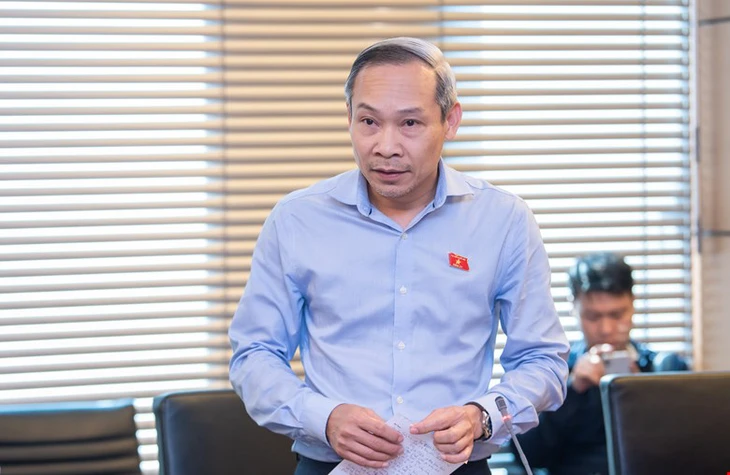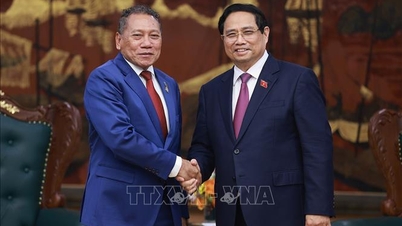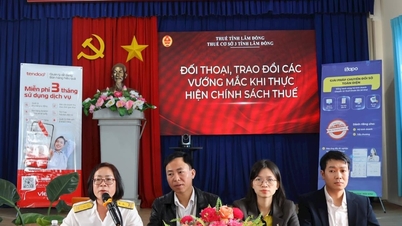Delegate Phan Duc Hieu - Photo: National Assembly
Commenting on the issuance of investment policies, delegate Phan Duc Hieu - a full-time member of the National Assembly's Economic and Financial Committee - pointed out the fact that even after completing the procedures for granting investment policies, enterprises still have to carry out other procedures such as construction, environment, etc.
Clearly stipulate procedures for granting investment policies
Therefore, if the regulations are unclear, it may lead to a situation where investors may have to “run around” from one procedure to another. That is, the regulations on investment policy approval must be really simple, as a basis for investors to carry out other procedures.
Although the draft law has simplified many procedures, Mr. Hieu expressed concern that regulations related to investment objectives, capital sources and scale could cause difficulties for investors.
For example, the increase in the capacity of a factory can be due to better technical improvements, or it can be reduced due to market influences. Therefore, the requirements for production scale need to be carefully evaluated, when in a market economy, what to produce, how much to produce and to whom the products are sold are determined by market demand.
Delegate Hieu also said that it is not advisable to design regulations requiring investors to prepare each set of documents and run procedures with all relevant state agencies. Accordingly, it is necessary to stipulate that there is only one focal point to receive investment documents , then this agency transfers them to specialized agencies for inspection, ensuring consistency.
"In case of necessity, there should be coordination between state management agencies and that is the internal matter of state management agencies to handle with each other, investors should not be forced to carry documents from one agency to another" - Mr. Hieu raised the issue.
Regarding investment protection, delegate Hieu assessed that the draft has provided very progressive regulations. However, the current regulations only protect investment in the event that the law changes the incentive mechanism, then the State is protected.
Meanwhile, in the case of investors investing in business and being granted business licenses, when the law does not prohibit, prevent or restrict business and the investor registers for 30-50 years. So how will this case be handled? Therefore, Mr. Hieu suggested that it is necessary to supplement regulations and protection mechanisms to ensure the harmonious interests of the parties related to investment incentives.
The nest is lined for the eagle but there is no way into the nest.
Delegate Le Kim Toan ( Gia Lai delegation) pointed out the fact that localities often call for investment through investment promotion conferences and organize domestic and foreign investment promotion delegations.
The basis for calling for investment is based on the local socio-economic development plan approved by competent authorities, listing projects and organizing promotions, meeting partners, introducing potentials...
However, when implementing, there are problems in legal regulations. For example, in the process of promoting investment, introducing the project, there are investors registering, the party calling for investment raises the issue of researching investment in the project, and signing the initial agreement.
However, for projects that must be bid for auction , while the locality has introduced and signed an investment agreement, it will cause difficulties in calling for potential investors due to the bidding and auction regulations.
"So how to solve that problem, need to review and unify regulations to "line the nest to welcome the eagles" but there is no way to enter the nest, there are barriers, due to conflicting and contradictory legal regulations? Need to distinguish preferential fields, call for investors with full capacity" - Mr. Toan raised the issue.
According to Mr. Toan, infrastructure development projects serving production, not for commercial purposes, must have special incentives. Land fees may be low, but long-term tax revenue will be much more sustainable.
Clarifying the list of conditional business lines
Regarding the narrowing of investment and business sectors, the Government abolished 25 conditional business sectors and narrowed the scope of 22 conditional business sectors. Delegate Hieu said that this regulation is unclear.
For example, regulations on 25 conditional business lines are abolished, investors will be able to establish businesses and freely conduct business without having to meet any conditions.
However, the accounting service industry still requires service providers to have a practice certificate, which delegates believe is inconsistent with the nature of abolishing conditional business lines.
Therefore, Mr. Hieu suggested that the Government should clearly explain which industries have abolished business conditions and which industries have simplified business conditions and changed management methods.
Source: https://tuoitre.vn/dai-bieu-khong-nen-bat-nha-dau-tu-om-ho-so-di-tu-co-quan-nay-den-co-quan-khac-20251111163240093.htm



![[Photo] Chu Noodles - the essence of rice and sunshine](https://vphoto.vietnam.vn/thumb/1200x675/vietnam/resource/IMAGE/2025/11/11/1762846220477_ndo_tl_7-jpg.webp)



![[Photo] Prime Minister Pham Minh Chinh receives Lao Minister of Labor and Welfare Phosay Sayasone](https://vphoto.vietnam.vn/thumb/1200x675/vietnam/resource/IMAGE/2025/11/11/1762872028311_dsc-2246-jpg.webp)



























































































![Dong Nai OCOP transition: [Article 3] Linking tourism with OCOP product consumption](https://vphoto.vietnam.vn/thumb/402x226/vietnam/resource/IMAGE/2025/11/10/1762739199309_1324-2740-7_n-162543_981.jpeg)








Comment (0)